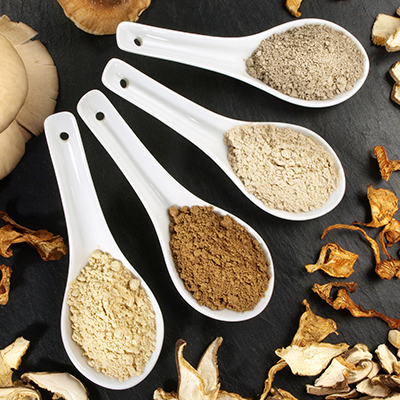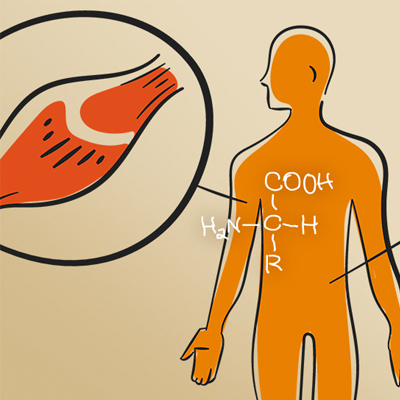Secondary Messengers
All information about "Secondary Messengers" and the related magazine articles can be found here.
Our articles are written clearly and link to scientific studies where relevant. This is how we meet our own standards: we regularly deliver new, high-quality content for you—free of charge, no sign-up required, with the highest possible benefit to you.

How a detox works
The human body works around the clock to eliminate harmful substances and toxins. But when there are too many toxins in the system, it needs help.

Alkaline diet
The pH of our organs plays an important role in our health. But how does our diet affect our body's acid-base balance?

How can I tell if I have a vitamin deficiency?
Tired, exhausted, aching limbs? A vitamin deficiency can take many forms, but is usually easy to treat. Find out what to look out for.

Often in short supply in winter - Vitamin D
Vitamin D is a real all-rounder when it comes to health: it ensures healthy bones and is involved in many processes in the human body.

Still unknown to many - medicinal mushrooms
Many people in Europe are still unfamiliar with the use of so-called medicinal mushrooms, but these mushrooms are an integral part of many traditional diets. Find out what they are called and what powers they have.

When the immune system needs a boost
Our immune system is usually good at fending off invaders. But how can we strengthen it so that it continues to work well under high levels of stress?

Get through the autumn and winter safely!
Colds are hard on the mind and body. Read here to find out how you can protect yourself against colds and give your body extra support.

Zinc, an essential trace element
Zinc is involved in many processes in the human body. Read here to find out why it is so important for us and what vegetarians/vegans should look out for.

Vitamins for hair loss
Biotin, vitamin D, zinc and selenium: When certain nutrients are lacking, hair suffers. Hair health can be supported by the right diet

Alternative treatments for bladder infections
Urinary tract infections are common. In most cases, the infection can be cured easily, and some home remedies can help the healing process.

The effects of the yam root
Yam is a staple food around the world. The yam is a staple food in many parts of the world, similar to the potato.

How curcumin works
Turmeric owes its bright yellow colour to the plant compound curcumin. But curcumin is much more than that.

Women in competitive sport
The effect of oestrogen and progesterone on training success has long been underestimated. The definable phases of muscle building, increased risk of injury and muscle recovery can now be used to create a successful training plan.

How galactose works
This simple sugar works differently to glucose and therefore has special properties that make it particularly interesting for diabetics. Find out more now

To do this, the body needs the amino acid L-tyrosine.
L-tyrosine is involved in many processes in the body, including the production of the hormones dopamine and adrenaline.

How to keep your gut flora healthy
What makes a healthy gut? And how can gut bacteria and the right diet help you stay healthy? Here are the answers to the most important questions about a healthy gut.

Vitamins for beautiful skin
Vitamins play an important role in our health - and our appearance. With the right nutrients, you can make your skin glow.

Green tea is so healthy
Green tea is considered healthy and is also said to help with weight loss. So it's not surprising that there are now many dietary supplements containing green tea extract. What is behind these supposed effects?

What is Astragalus extract?
Astragalus root extract has been used in traditional Chinese medicine for thousands of years.

What makes collagen special
Collagen is best known for its role in the connective tissue of the skin. Skincare products or supplements containing collagen are often advertised as having an "anti-ageing" effect. But the protein can do more.

What is L-Arginine?
L-Arginine is a term that is often used in connection with weight training supplements. Read on to find out what it is and how it can benefit athletes in particular.

Can vitamin B12 help you lose weight?
Vitamin B12 is involved in many metabolic processes in the human body. Many people find that weight gain and B12 deficiency often occur together. Why is this the case?

Vitamin B12 - what it is and how to recognise a deficiency
Vitamin B12 is an important vitamin that can only be obtained from certain foods. Find out which processes the body needs it for and how to make sure you get enough.

What are amino acids?
Messenger substances: our body's own communication experts
Imagine entering a huge house with billions of rooms. Employees sit in each of these rooms, constantly communicating with each other to keep the entire building running. This is exactly how you can imagine your body, with the rooms representing the cells and the employees representing the various organs and tissues.
But how exactly does this communication work? This is where the messenger substances come into play – our body's own communication experts.
What are messenger substances?
Messenger substances, also known as chemical messengers, are molecules that transmit information between cells. They are used by living beings for signal transmission or chemical communication (chemocommunication). Messenger substances are fundamentally important for the interaction and communication between cells and tissues within an organism. They are, so to speak, the language with which our body communicates internally. Neurotransmitters, for example, are special messenger substances that play a central role in the nervous system, especially in the brain.
How do messenger substances differ from hormones?
Hormones are a special type of messenger substance that are produced by endocrine glands and released directly into the blood to exert their effect on distant target organs. The main difference lies in their range of action:
- Hormones act systemically throughout the body, while other messenger substances often have a local effect.
- While all hormones are messenger substances, the opposite is not true. There are many messenger substances that are not hormones, such as neurotransmitters in the brain.
- Hormones are released into the blood and can thus act throughout the body, while other messenger substances, such as neurotransmitters, are often only active in limited areas, such as at synapses between nerve cells.
What are the best-known neurotransmitters?
Neurotransmitters are special messenger substances that play a central role in the nervous system, particularly in the brain. They transmit signals between nerve cells and thus control our thoughts, feelings and actions. The best-known neurotransmitters include serotonin, often referred to as the “happy hormone” because it has a strong influence on our mood and well-being. Healthy serotonin levels are crucial for preventing depression and anxiety [1].
Another essential neurotransmitter is dopamine, which is responsible for motivation and reward; a deficiency or imbalance can lead to problems such as listlessness or addictions. Acetylcholine, on the other hand, is important for muscle contraction and cognitive function, especially memory, while GABA, as an inhibitory neurotransmitter, has a calming effect and helps us to cope with stressful situations. The balance of these neurotransmitters is crucial for our mental and physical health and they illustrate how complex our internal communication via chemical agents is organized.
How many messenger substances are there?
It is difficult to say exactly how many messenger substances there are, as research is constantly discovering new ones. In the brain alone, we now know of more than 100 different neurotransmitters. In addition, there are numerous hormones and other signaling molecules in the body. These range from simple amino acids to complex peptides. This diversity enables the human body to react precisely.
From production to effect: the path of a messenger substance
The path of a messenger substance involves several important steps, from its production to its effect in the target cells:
- Production: Messenger substances are produced in special cells.
- Storage: Many messenger substances are stored in vesicles (small bubbles).
- Release: A signal triggers the release of the messenger substance.
- Transport: The messenger substance moves to its target cell.
- Binding: At the target cell, the messenger substance docks onto specific receptors.
- Effect: The target cell reacts to the signal.
- Degradation or reuptake: The messenger substance is degraded or transported back to the cell of origin.
This complex process takes place millions of times in our bodies and enables us to react to our environment, to feel emotions and to adapt our behavior.
What are the tasks of messenger substances in the human body?
Messenger substances control almost every aspect of our lives:
- Metabolism: Hormones such as insulin regulate our energy balance and help control blood sugar levels.
- Emotions: Neurotransmitters such as serotonin influence our mood and play an important role in the development of depression.
- Pain sensation: Endorphins, our body's own painkillers, are released when we feel pain and can lead to a feeling of euphoria.
- Sexuality: Hormones such as testosterone and estrogen control our sexual development and behavior. They influence not only physical characteristics but also libido and fertility.
- Learning and memory: Acetylcholine plays an important role in cognitive processes and is crucial for the formation of new memories.
- Sleep-wake cycle: Melatonin regulates our sleep cycle and is influenced by light.
Messenger substances in nature: from honeybees to insects
Humans are not the only ones to use chemical signals for communication: honeybees, for example, communicate via pheromones to coordinate the swarm. These chemical signals help them find food sources and signal danger.
In many insects, chemical signals play a role in finding a mate. Some butterfly species can detect the pheromones of potential mates over a distance of several kilometers.
Plants also release messenger substances to defend themselves against pathogens. They can even warn neighboring plants when pests attack.
How messenger substances affect our health
It is now clear that messenger substances are important for our health. It is therefore only logical that an imbalance of messenger substances can lead to various illnesses [2]:
- Depression is often associated with a serotonin deficiency. This leads to therapeutic approaches that aim to increase serotonin levels in the brain.
- In Parkinson's disease, dopamine-producing cells die, leading to the characteristic movement disorders.
- Diabetes occurs when the body does not respond properly to the hormone insulin or does not produce enough of it.
- Thyroid disorders are often due to an over- or underproduction of thyroid hormones.
What influence do drugs have on the messenger substances in our body?
Drugs have an extreme effect on our neurochemical processes and influence the finely tuned balance of our neurotransmitters. One example is cocaine, which blocks the reuptake of dopamine. This leads to an intense feeling of happiness, but in the long term it can lead to the exhaustion of the dopamine system.
Opiates work by binding to the same receptors as our body's own endorphins. This binding explains not only their pain-relieving effect but also their high addictive potential. Regular use can cause the body to become accustomed to the drug, requiring ever-higher doses.
Alcohol, on the other hand, has a complex effect because it influences various neurotransmitter systems. For example, it enhances the effect of GABA, which leads to its calming effect. At the same time, it inhibits the activity of glutamate, which increases the dampening effect on the central nervous system.
How are genes and messenger substances related?
Neurotransmitters such as dopamine play a crucial role in signal transmission in the nervous system and can subsequently regulate the activity of certain genes. In extreme cases, this can even influence cognitive performance such as intelligence. Particularly interesting in this context is the epigenetic regulation of genes that code for dopamine receptors.
This regulation can be triggered by various environmental influences, such as stress. Such external factors can cause epigenetic changes in genes via messenger substances and significantly influence their activity [3]. These findings not only help us to understand how our brain works, but also open up new perspectives for understanding and possibly treating neurological and psychiatric disorders in which gene regulation plays an important role.
Messenger Substances and Nutrition
Our diet plays a crucial role in influencing the production and effect of neurotransmitters, which in turn significantly determines our physical and mental well-being and influences how much energy we have. Tryptophan, an essential amino acid and precursor of serotonin, is found in protein-rich foods such as chicken, turkey and nuts. This compound is important because it supports the body's production of the “happy hormone” serotonin, which is crucial for our mood and emotional balance. Omega-3 fatty acids, found primarily in fatty fish such as salmon and mackerel, also promote the function of neurotransmitters and can potentially help prevent depression by supporting brain health.
Equally important is vitamin B6, which is found in foods such as whole grains, bananas and potatoes, as it supports the production of numerous messenger substances and thus strengthens the nervous system. A balanced and nutritious diet thus ensures that the synthesis and effect of messenger substances is optimal, which directly contributes to a better sense of well-being and an overall healthier lifestyle.
What does stress have to do with messenger substances?
Stress activates various messenger substances in our body:
- Cortisol, often referred to as the stress hormone, is released in stressful situations and prepares the body for fight or flight.
- Adrenalin, another stress hormone, increases heart rate and blood pressure and mobilizes energy reserves.
Chronic stress is a challenge for our body, can lead to an imbalance of these messenger substances and impair our health in the long term.
Messenger substances in the course of life
From birth to death, the production and effect of many messenger substances changes:
- The production of growth hormones decreases, which leads to changes in muscle development and fat distribution.
- The levels of sex hormones such as estrogen and testosterone decrease, which triggers the menopause or andropause.
- The sensitivity of receptors can decrease, which affects the effectiveness of messenger substances.
Messenger substances hold our biological system together
Neurotransmitters are the invisible threads that hold our complex biological system together: from controlling our daily functions to our deepest emotions, they are involved in everything. Neurotransmitters are the basis of our lives, our feelings and our experiences. And every day we learn more about the important chemical messengers that make us who we are.
Research into neurotransmitters has revolutionized our understanding of the human body and is constantly opening up new possibilities in medicine and science. From the development of new drugs to insights into the emergence of consciousness, neurotransmitters play a central role in all areas.
Sources:
[1] https://pubmed.ncbi.nlm.nih.gov/31002895/
[2] https://pubmed.ncbi.nlm.nih.gov/37385351/
[3] https://pubmed.ncbi.nlm.nih.gov/19259783/
